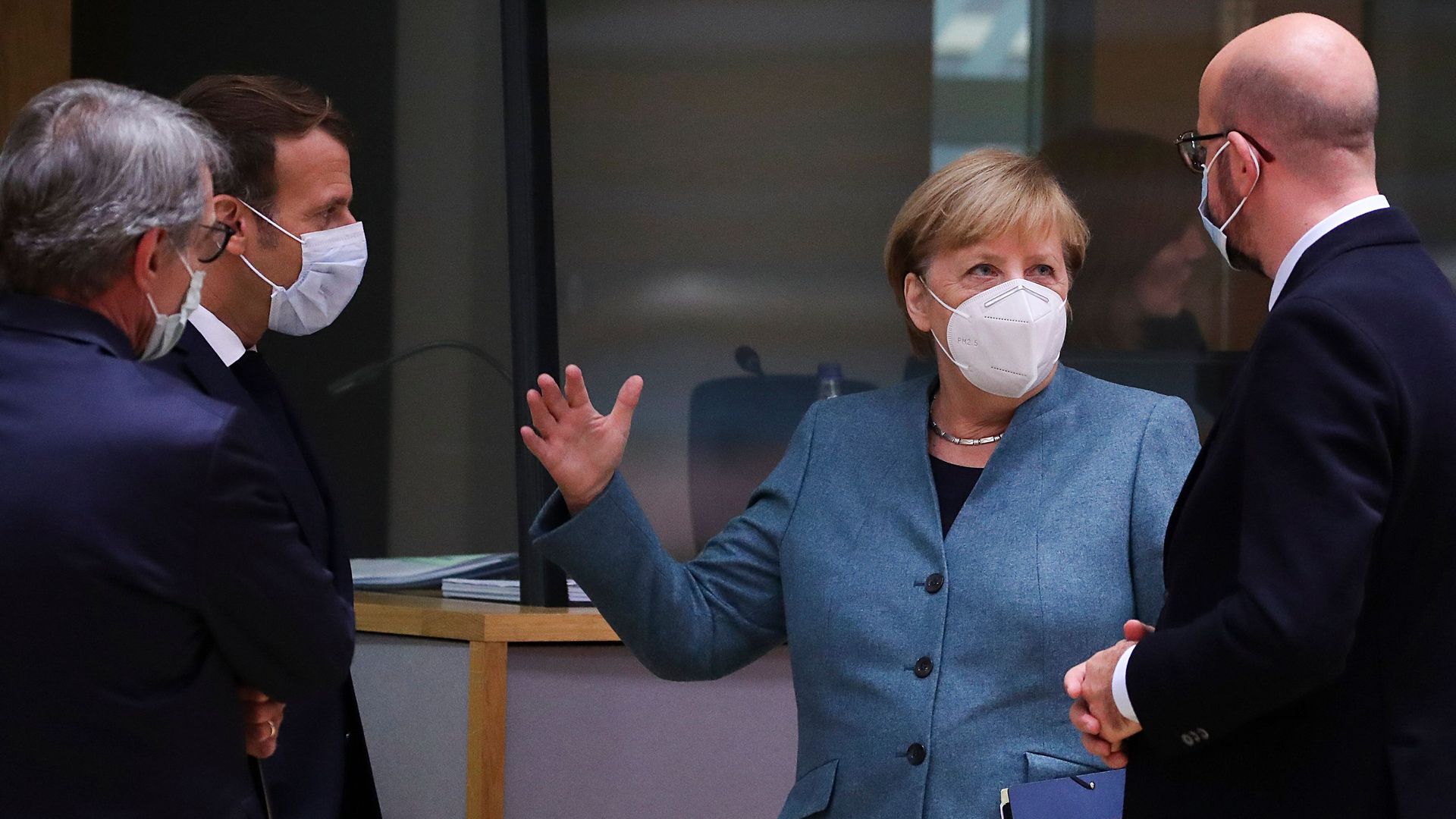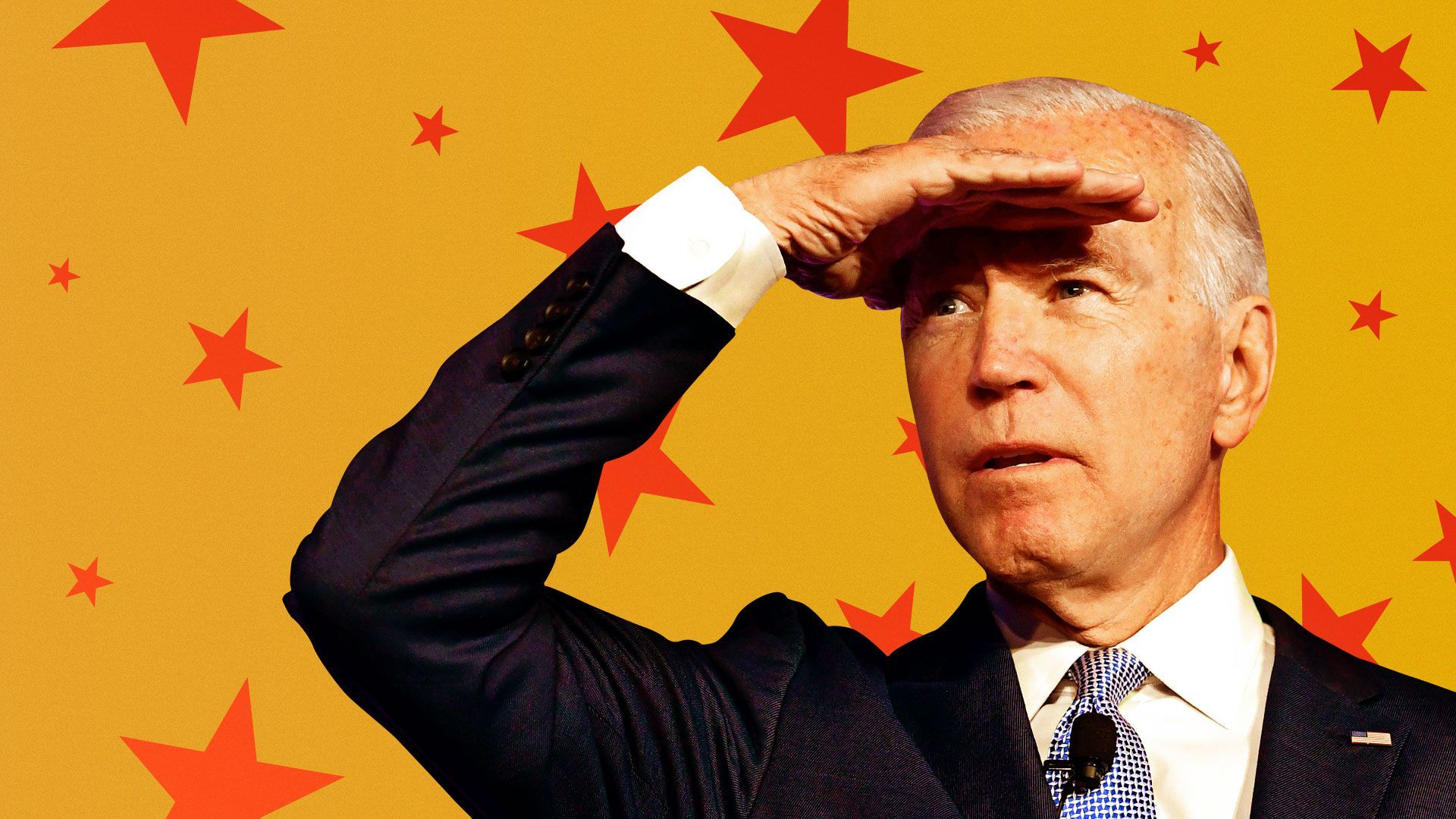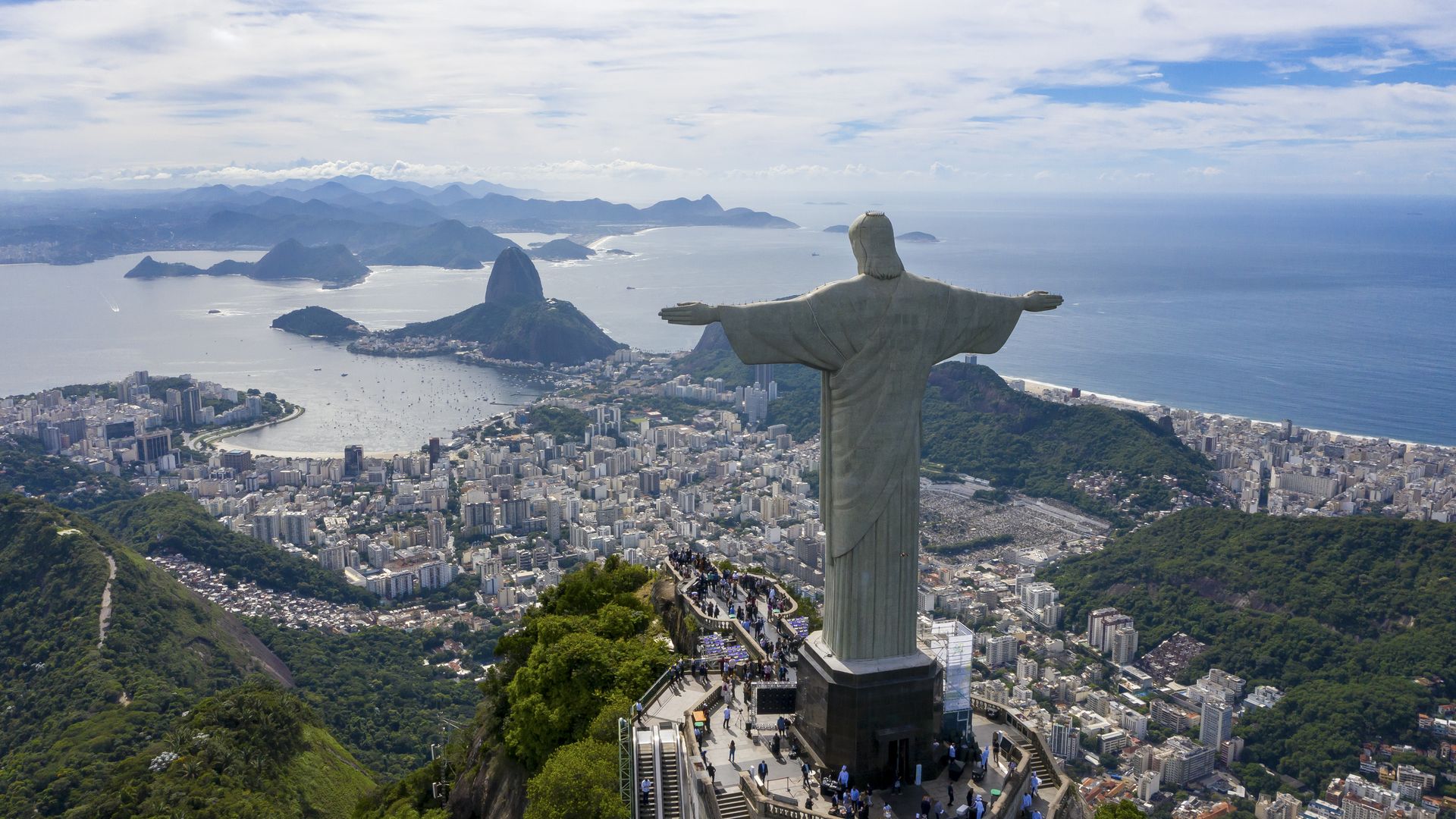| | | | | | | Presented By Babbel | | | | Axios World | | By Dave Lawler ·Mar 04, 2021 | | Welcome back to Axios World. Tonight's edition (1,551 words, 6 minutes) takes off from Italy and does not land in Australia, due to an export ban. - Heads-up: We're off on Monday. We'll be back in your inbox on Thursday, by which time I'll be married.
- Flashback: Some long-standing readers may recall that I also took some time off to get married last March, before the pandemic intervened. We're excited to finally make things official on Saturday.
New arrival? Sign up. | | | | | | 1 big thing: EU fights for a vaccine it's hardly using |  | | | Macron, Merkel and European Council President Charles Michel (R) at a summit in October. Photo: Yves Herman/Pool/AFP via Getty | | | | Italy today blocked the export of 250,000 AstraZeneca doses to Australia, becoming the first EU country to exercise an export ban due to a vaccine shortfall in the bloc. Why it matters: The controversial step exposes multiple major challenges to distributing vaccines — even among the world's richest countries. The state of play: AstraZeneca has already been running way behind schedule in providing doses to the EU. Now the company says it will provide less than half of the doses originally promised in the second quarter as well. - That has infuriated European leaders, who are under pressure due to a remarkably inefficient vaccine rollout to date. Just one dose has been administered in the EU for every three in the U.S. and every four in the U.K., adjusted for population.
- That helps explain the decision by Italy, backed by the European Commission, to block a shipment of 250,000 doses bound for Australia from a U.S.-owned plant near Rome, where the vials were being filled.
- The action was taken under a system developed in January — amid a fractious dispute with AstraZeneca over access to doses produced in Britain — to allow for vaccine exports to be blocked if a company hasn't met its obligations to the EU.
Yet, but: Supply isn't the only problem. EU countries including Italy are already sitting on hundreds of thousands of unused AstraZeneca doses. - There has been a general sense of hesitancy surrounding the vaccine, fueled in part by an erroneous report on its efficacy in a German newspaper and by French President Emmanuel Macron's bizarre claim that it was "almost ineffective" in people over 65.
- France and Germany only approved the vaccine for people over 65 this week after delaying due to insufficient data.
- By the numbers: France had only administered 16% of the AstraZeneca doses it had received as of last Friday, while Italy and Germany have both used around 21%.
Driving the news: Real-world data from the U.K. — which is relying heavily on the homegrown vaccine, which was developed at the University of Oxford — now suggests the vaccine is highly effective at preventing hospitalizations among older people even after a single dose. Between the lines: EU countries have caused two international incidents, with the U.K. and now Australia, over access to a vaccine that they're hardly using. - And all of this is happening at a time when countries around the world, many of which will be relying on the AstraZeneca vaccine, haven't gained access to any vaccines at all.
What to watch: Italy's decision also underscores the difficulties that countries relying on imports are facing in receiving doses. - Canada, for example, has ordered more doses relative to its population than any other country, but it's received relatively few.
- Meanwhile, the U.S., which has the world's largest vaccine manufacturing capacity, according to Airfinity, is on course to produce enough doses by May to cover its entire adult population.
|     | | | | | | 2. What they're saying: Blinken and Xi on U.S.-China competition |  | | | Photo illustration: Eniola Odetunde/Axios. Photo: Frederic J. Brown/Getty Images | | | | Secretary of State Tony Blinken laid out the Biden administration's top foreign policy priorities in the first major speech of his tenure on Wednesday. The big picture: Those objectives include ending the pandemic, facilitating an "inclusive" global economic recovery, revitalizing alliances, creating a "humane" immigration system, and fighting climate change. - Blinken said the U.S. must lead the way in developing transformative technologies while setting "guardrails against misuse," and renew democracy at home while promoting it overseas (though not through the use of force).
- He expressed more skepticism toward free trade agreements than might be expected, while emphasizing the need to fight international corruption, intellectual property theft and currency manipulation.
Blinken's speech concluded with the challenge posed by "the only country with the economic, diplomatic, military and technological power to seriously challenge the stable and open international system" — China. - Blinken emphasized the importance of wielding influence in international organizations, standing up to China on human rights and "insisting on a level playing field" in economic competition.
- He also stressed the need to work with allies and partners to confront Beijing.
- Between the lines: While a top Biden priority, that's easier said than done given China's deep economic links with every corner of the world, including with America's allies in Europe and Asia.
The other side: In remarks published last week to a government website, a Chinese official quoted Chinese President Xi Jinping as saying, "The biggest source of chaos in the present-day world is the United States," per NYT. - Xi also described the U.S. as the biggest threat to China's development and security, according to the official.
- A separate account quoted Xi telling a group of party members that "the East is rising while the West is declining." However, Xi also frequently notes that the West remains stronger than the East in several ways, the NYT notes.
What's next: Thousands of officials will convene in Beijing tomorrow for the annual gathering of the National People's Congress. - The NPC is expected to apply its rubber stamp to China's 14th five-year economic plan, among other policies, per the FT.
- Flashback: Xi announced his national security law for Hong Kong at last year's gathering. This time, he'll be positioning himself to secure an unprecedented third term in 2022.
|     | | | | | | 3. Data du jour: Seeing China as an enemy |  1 in 3 Americans, and a majority of Republicans, now view China as an enemy of the United States, according to a new survey from Pew Research Center. By the numbers: Just 9% of Americans consider China a "partner," while 55% see Beijing as a "competitor" and 34% as an "enemy." - Americans over 65 (49%) are much more likely to view China as an enemy than do 18- to 29-year-olds (20%).
- White respondents (42%) were also much more likely to see China as an enemy than Black (12%) or Hispanic (21%) respondents.
- The biggest gap came between Republicans (53%) and Democrats (20%).
By the numbers: Republicans (72%) are also far more likely than Democrats (37%) to prioritize getting "tougher" with China over strengthening economic relations, according to the survey. - But Republicans (72%) and Democrats (69%) are aligned in believing the U.S. should promote human rights in China even if it harms economic ties.
- The trend: The percentage of Americans viewing China negatively climbed from 46% in 2018 to 67% in 2021.
|     | | | | | | A message from Babbel | | How to learn a new language in three weeks | | |  | | | | 73% of Babbel users said they could have a simple conversation in their new language after just 5 hours of lessons. The reason: The language app makes it easy with bite-sized lessons, so you can spend less than 15 minutes a day learning language skills you'll remember. Sign up today and get 50% off. | | | | | | 4. Freedom in decline |  The global erosion of democracy has continued for a 15th consecutive year, according to an annual report from Freedom House. Zoom in: The report calls particular attention to India, which slipped from "free" to "partly free" due to the government's "scapegoating of Muslims" and "crackdown on critics." Prime Minister Narendra Modi is, according to the report, "driving India itself toward authoritarianism." What's happening: Governments in several countries used the cover of the pandemic to consolidate control. - In the Philippines and Cambodia, authorities cracked down on critical news outlets and social media users in the name of preventing misinformation.
- In Algeria, the government used coronavirus restrictions as a justification to suppress a protest movement.
- Perhaps the most disheartening aspects of the report include places like Belarus, Hong Kong and Venezuela where pro-democracy movements rose up in the last two years — only to be met by deeper repression.
Worth noting: The one country to improve its status, from "partly free" to "free" was the Seychelles. - In addition to a strengthening democracy, the islands also have one of the world's highest vaccination rates. Oh, and tomorrow's forecast is 79°F and sunny.
|     | | | | | | 5. What I'm reading: Afghanistan before the exit |  | | | A Hazara on the outskirts of Kabul. Photo: Wakil Kohsar/AFP via Getty | | | | With two months left before the deadline for a full U.S. withdrawal from Afghanistan, the New Yorker's Dexter Filkins paints a portrait of the country America would be leaving behind. The Afghanistan Filkins describes is sapped of any post-invasion idealism and defined largely by violence and fear. - An Afghan general says his troops can hold off the Taliban — they just need more time. U.S. commander Gen. Austin Miller can offer no clarity on America's timeline, and little confidence about what comes next. Asked if the Afghan army could maintain security alone, Miller tells Filkins simply, "they have to."
- President Ashraf Ghani accuses the U.S. of giving away leverage and of undermining his legitimacy by negotiating with the Taliban. U.S. officials describe him as obstinate. A prominent businessman calls Ghani "delusional."
- The "post-2021 generation" in the cities — activists, university graduates, entrepreneurs — fear a return to Taliban rule. But some Afghans are even more wary of a government they view as corrupt, distant and even cruel.
- Taliban negotiators, many of them former Guantanamo detainees, have incentives to seek a power-sharing deal. But a Talib described as the "mayor" of a neighborhood in western Kabul scoffs at that idea. "We're not sharing power with anyone," he tells Filkins.
Dive in. |     | | | | | | 6. One to watch: The pope heads to Iraq |  Data: Vatican News; Map: Danielle Alberti/Axios Pope Francis is forging ahead with the first papal visit to Iraq despite a spike in coronavirus cases and a spate of recent attacks in the country. - Some fear that "a trip designed largely to bring peace and encouragement to Iraq's long-suffering Christians has the potential to be a superspreader event," per the NYT.
- But after his two predecessors were forced to abandon plans to visit Iraq — the birthplace of the prophet Abraham — Francis is determined to make the trip.
- The visit has enormous symbolic value for Iraqi Christians, who were violently persecuted under the Islamic State.
See his itinerary. |     | | | | | | 7. Stories we're watching |  | | | Rio, looking pretty. Photo: Buda Mendes/Getty Images | | | - U.S. sanctions Russian officials over Navalny
- Police raid and arrests deepen FC Barcelona crisis
- Germany's far-right AfD party placed under surveillance
- Pentagon: Domestic extremists pose threat to military
- U.S. contractor dies after rockets hit Iraq air base
- Global carbon emissions rebound to pre-COVID levels
- The search is on for people to orbit the Moon
Quoted: "Dear Marshal Kim Jong Un said during his exclusive meeting with the U.S. president that we are at the footsteps of a new beginning." — A reference to the 2018 Singapore summit in a new official biography of the North Korean leader, per WSJ. |     | | | | | | A message from Babbel | | The app that'll teach you a new language in less than a month | | |  | | | | Babbel helps you become conversational in a new language with just three weeks of practice. The number one selling language app teaches you the skills you need for real-life scenarios, excluding any random words or unhelpful phrases. Get 50% off one of 14 languages. | | | | | | Axios thanks our partners for supporting our newsletters.
Sponsorship has no influence on editorial content. Axios, 3100 Clarendon Blvd, Suite 1300, Arlington VA 22201 | | | You received this email because you signed up for newsletters from Axios.
Change your preferences or unsubscribe here. | | | Was this email forwarded to you?
Sign up now to get Axios in your inbox. | | | | Follow Axios on social media:    | | | | | |










No comments:
Post a Comment